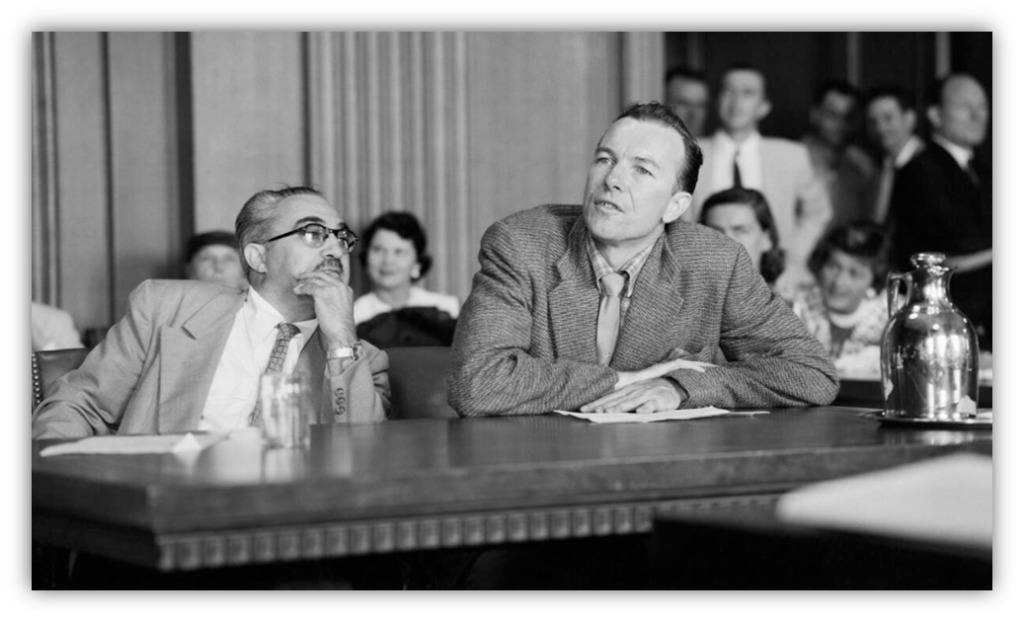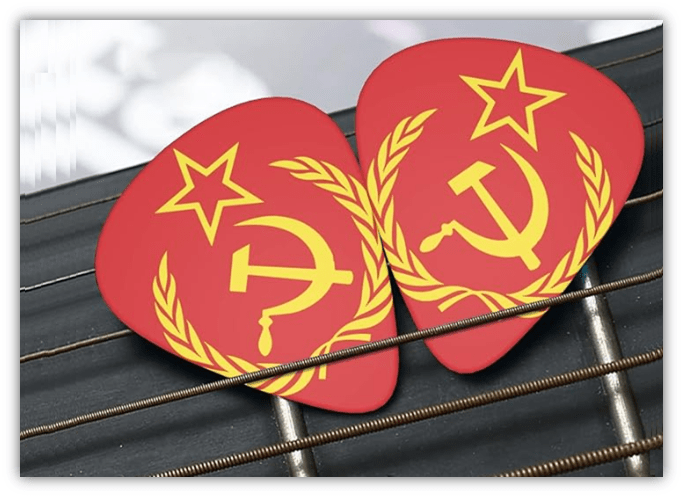On June 30, 1950:
The single “Goodnight Irene” by The Weavers hit #1 on the Billboard charts.

And would stay at the top for 13 weeks.
This was a new rendition of a folk standard first recorded by Leadbelly in the 1930s. As delivered by the Weavers, “Irene” was a pleasant and comforting slice of old-timey Americana. As wholesome as wholesome as could be.
Less than five years later: one of the band’s singers, Pete Seeger, would be charged with contempt by the House Un-American Activities Committee for failing to testify against his compatriots as possible communist subversives.

Though his conviction was eventually overturned upon appeal, Seeger was blacklisted from radio, television, and concert halls for his communist sympathies.
Under Franklin Roosevelt’s presidency, the political climate had been so much more welcoming to leftist artists and activists.
But once the USSR emerged as the great threat to democratic nations, suddenly, there was a growing pressure to minimize any possible similarities to Soviet Russia. This presented a problem for the activists, artists, and intellectuals who espoused an ideology rooted in communism.
It wasn’t an uncommon position among these crowds!

Back then, labor rights movements, socialist economic policies, communist sympathies, and general revolutionary sentiment all swirled around together in leftist circles.
Everyone agreed that working people needed more freedom and influence, that colonial powers exploited the rest of the world, and that the elite classes would not give up their power without a fight. So long as everyone agreed on that general leftist narrative, the particulars didn’t matter so much.
Think back to the 1943 photo of Woody Guthrie holding a guitar with the words “This Machine KILLS Fascists” painted on it.

It’s now an important slice of American history, an iconic depiction of liberal, anti-authoritarian values.
Many Americans these days don’t know that Woody Guthrie too was a communist. And not simply a student of Marx…but someone who championed Joseph Stalin. As did Pete Seeger, who played with Guthrie in a folk group called The Almanac Singers before starting up The Weavers.

Guthrie and the Almanac Singers both wrote musical calls to arms against Hitler, such as “Round and Round Hitler’s Grave” and “Tear the Fascists Down.”
But they only did so after Hitler broke his non-aggression pact with the USSR. Before that, Guthrie had been silent on the issue of war, and Seeger had actually released some anti-war songs, which were pulled once the US entered the war. This coordination with Soviet Russia is a fact that most people don’t share these days, even among their fans.
As for anti-communist sentiment in the US, this reached a fever pitch once Joseph McCarthy rose to power.
In 1950, the Wisconsin Senator grabbed headlines by announcing that he had a list of names of people within the US government who were in fact communist spies.

In 1953, McCarthy became chairman of the Senate Committee on Government Operations, and began to investigate possible secret homosexuals and communists in the government. This was the dawn of the Red Scare.
A televised trial against the US Army eventually put McCarthy’s shameless antics on display for the nation to see, and this was the source of Joseph Welch’s immortal line against him:
“At long last, have you no decency, sir?”
Joseph Welch -June 9, 1954
By the end of the 50s, McCarthy had become an embarrassment to his own party. He was censured by a bipartisan majority in the Senate, and the national fever broke. These days, McCarthyism is shorthand for paranoiac fantasies and political witch hunts.
But let’s not overcorrect. Overkill on one side doesn’t mean there was no threat coming from the other side. There were real Soviet spies discovered around this time.

Alger Hiss was a government official suspected of espionage. Even now, it’s unclear whether he was really a spy or not, but it remains a credible possibility.
Certainly the man who accused him of such, Whittaker Chambers, was a real Soviet spy.
Then there were Julius and Ethel Rosenberg, a husband and wife living in Manhattan’s Lower East Side.

To their neighbors, they were just a nice family like everyone else, but they were found guilty of smuggling US defense information to Russia.
For decades, activists on the left were convinced that these two were innocent victims of Red Scare paranoia. This may have been somewhat true for Ethel Rosenberg, who did far less than what she was tried and convicted for. But it is now clear that Julius Rosenberg was indeed a spy for the Soviets. The threat had been real.

Incidentally, the man who adopted the Rosenberg children after their parents’ execution was Abel Meeropol, author of the poem that became Billie Holiday’s great protest song, “Strange Fruit.”
Perhaps not surprisingly, he was also a card-carrying member of the US communist party.
More disturbingly, there was David Alfaro Siqueiros, a revered muralist from Mexico.
As mentioned in FREE4ALL Part One, Siqueiros had trained Jackson Pollock in automatic painting techniques in 1936.

Just four years later, he attempted to assassinate the Soviet exile Leon Trotsky in the name of Joseph Stalin. He was unsuccessful, and Trotsky was killed not long after by a Soviet secret agent.

Siqueiros no doubt justified his violent actions with calls against global colonialism and the exploitation of oppressed peoples, just as every leftist does. His murder of Stalin’s rival would simply have been one necessary step in furtherance of that goal.
How does one differentiate between youthful edgy rhetoric and real, committed radicalism?
It’s sometimes impossible to tell the difference, unless a moment of truth comes to reveal how well or poorly one’s deeds match one’s words.
I’m willing to guess that most of the leftist artists and activists of the time were idealists who simply indulged in radical talk from time to time, rather than actual Soviet sleepers. But it’s admittedly hard to suss out. Especially because the artists who supported Stalin, Mao Zhedong, Fidel Castro, and other communist leaders tended not to be very honest or self-reflective about their support once those figures proved to be dictators of brutal authoritarian regimes.

For his part, Pete Seeger apologized in his 1993 autobiography, “for thinking that Stalin was merely a hard driver and not a supremely cruel misleader.”
But given all that was known about the brutality of Stalin’s regime at that late point in history, even this apology reflects a lack of deep introspection on Seeger’s part.
And there were many earlier red flags for anyone who wished to see them.
The hard truth is that Seeger had spent decades of his life serving intermittently as a soft propagandist for communist regimes around the world, turning a blind eye to their abuses and their contempt for their own people.

Like so many other dreamers caught up in a revolutionary moral narrative, he waved away the inconvenient facts that might have challenged his way of seeing the world.
Still, Seeger and other similar figures deserve great praise as well.
Sure, they ignored or placated real threats to liberty, but they were also very important for our collective pull toward a more ideal form of liberal democracy.

They strove for worker rights and civil rights, and for more humane standards of international conduct. They also pushed for greater artistic freedom, either explicitly or through the act of protest.
When Seeger was on trial for possible communist subversion, he invoked his fifth amendment rights to protect against possible incrimination of his friends and colleagues.

Maybe he helped spare a real Soviet spy or two; we’ll probably never know.
But he also championed the government’s protection of its own citizens, which is the heart of liberalism. Conservatives hate this fact about our culture, but we do in fact contain multitudes, lefty radicals included. As Woody Guthrie said in his classic anthem: “This land was made for you and me.”
The music of Woody Guthrie and Peter Seeger soon served to inspire other giants of folk revival, and these individuals joined themselves to larger protest movements.

First came Odetta and Harry Belafonte singing for black civil rights.
Then there was Bob Dylan and Joan Baez protesting the Vietnam war. What could have simply been pleasant nostalgia for the good ol’ days became a nationwide force for positive change.
As for that soft support of communist dictatorships, I think it helps to highlight something general about human reasoning.

Individual people contain multitudes, too.
These folks were complicated human beings with real flaws and blind spots. Sure, they often ignored the evils of communist regimes, but they also zeroed in on real problems and evils of our own nation, and helped to initiate a way forward.
To some extent, this must also be true of many people with right-leaning sympathies:

Who got caught up in the righteousness of a reactionary narrative, though they themselves did not take active part in the thuggery that they empowered.
And it’s still true today.
I don’t expect people to own up to the worst aspects of a radical narrative they may support. Such an expectation flies in the face of what I know about human nature. But perhaps we can honor the most admirable aspects of a narrative, and praise the most commendable deeds accomplished by people tied to that narrative.
We’ll never find perfection.

But I’m hoping such a pragmatically graceful approach can effectively inspire us to soldier on in spite of our many shortcomings, and bring us to a better place.
Thanks to Americans like Pete, we shall not be moved.
Instead, together, we shall move.
Let the author know that you liked their article with a “Green Thumb” Upvote!





I contain multitudes, and none of us can find my keys.
These days, it’s far too easy to perceive someone as one dimensional when all we see of them is an avatar and a single opinion. That makes for some nasty social media interactions.
This carries over to what’s bound to be a nasty election year here in the U.S. Just because your neighbor has a sign for this candidate or that candidate doesn’t mean they agree with all of that candidate’s positions. I know which candidates I’m going to vote for, but don’t agree with all their policies and I try not to fanboy myself into ignoring their bad policies.
In the US, we’re given essentially two choices for president. It’s not always the lesser of two evils, but sometimes it is. We just have to deal with it. No matter how minor, whether it’s only for town council, vote in every election. It’s important.
I can’t for the life of me, come up with the answer as to why we are where we are. Some theories:
– The Facebookification of America. Ugh.
– Fox, CNN, Newsmax, et al, providing WWF levels of infotainment to the board and ignorant masses, who used to do the same thing – it was instead following sports teams
– In the last 40 years, the failure to recognize that the middle-class is being crushed. Being quite poor or quite wealthy, is the current trend; a hard days work, and having a couple of bucks at the end of the week for ice cream money has gone by the boards, and neither political party did much to address it; in fact, you could argue all players were complicit in ignoring the fact.
And this results in a lot of really ticked off voters, who vote from anger and frustration rather than from measured critical thinking, or at least common sense.
But what do I know? Maybe I should just stick to talking about what a great record “Kung Fu Fighting” was.
Hey, thanks to this site, we can do both!
Your superpower is to make people feel better. Thank you for that.
Ugh. Now I’m all fired up again.
(breathing deeply)
I’ll just address the cable news network I watch.
MSNBC has to show more courage.
I’ll stop there.
With respect to this year’s presidential election, it is a good deal trickier.
Of course you’re right, the best way to reach people is by connecting with them, and not offering up some litmus test standard for acceptance.
And plenty of people who vote for Trump will do so with mixed feelings, maybe even holding their nose as they do so.
But it’s also true that most of the conservative base these days rally together around their own litmus tests: “real” Americans vs everyone else.
So much of the conservative identity now centers on a catechism that declares liberals, city dwellers, academics, experts, institutionalists, and even conservatives who disagree with them to be evil and dangerous radicals.
Even so-called moderates like Chris Christie and Nikki Haley still have to pander to that very toxic narrative. It’s not healthy at all.
So I do agree with you, it’s important to connect with people, to accept their multitudes and contradictions, to prioritize real community over abstracts. But as I alluded to in the piece, there are moments of testing where the ideas are no longer abstract.
Radical talk is all fine and good when it’s just talk. But should the radical actions and policies come, God help us all.
I have to take a breath. Okay.
Third-party candidate Ralph Nader taught me that both parties were identical. Okay. Let me tread carefully here. For the record, I don’t vote. Technically, I’m an independent. Nothing is really my opinion. I’m just parroting what I read. But you can’t win as a liberal: George McGovern. So it was Nader’s belief that center-left and center-right were identical.
I stopped paying attention to current events.
It was a guy at work who told me that I was living in the relative past. I don’t want to get specific. But I took his advice. I read about how politics work. You’re not going to learn that from watching cable news.
I agree. There is a lesser of two evils.
Okay. That’s it. Short and sweet.
A fine nuanced assessment. There’s good and bad on all sides and within each person. Even if the perception these days seems to be so black and white in drawing sides and painting everything that is seen as being on the other side as bad. The deliberate lack of understanding on the part of vocal politicians and online keyboard warriors only seeks to shore up support from a particular demographic rather than find common cause.
There’s a disturbing level of thoughtful commentary here–not sure that’s allowed.
What’s the old saying? Conservative at 20 = no heart; liberal at 40 = no head. We’ll I’ve been headless for a long time, but I suppose that even I may contain multitudes. (Or multitude. Can it be singular?) I do know that I am genuinely and seriously concerned about the state of democracy, and fear that what we are (or strive to be, anyway) is not necessarily going to survive into the future. I think the loss of American democracy would be a bad thing in the world. I happen to be reading a novel set in Germany between the wars, and I’ve gotta say that it’s setting off alarm bells for me.
I do believe, on balance, that social media is turning out to be a net negative for society (says the guy typing in an online discussion forum), but really, that cat is well and truly out of the bag. Maybe I’m remembering a golden age that never existed, but I swear that civil discourse used to be something we engaged in quite readily. It’s not easy these days. (It would help if everyone would just agree with me. I mean, come on people.)
Now, where did I leave that job application for Cyberdyne Systems?
There’s another saying that I’m finding some truth in: left-wing radicalism is something you age out of, while right-wing radicalism is something you age into.
If we’re gonna go radical, let’s go all in for a Butlerian Jihad, and make the digital empire of Cyberdyne/DALL-E-3/HAL9000/ as barren as House Harkonnen.
Had to look that one up. It’s been too long since I read Dune (1976-ish?), and haven’t seen the new movies.
I fall fully on one side of the line and have for years now despaired of the mindset of the other. Recently, however, I’ve come across podcasts, articles, etc., in which the author/host tries to figure out a strategy to have a productive discussion with those who disagree. What it ultimately comes down to is not trying to convince your sparring partner why you’re right, but understanding where they’re coming from, why they’re coming from there, and how they’ve arrived at their current viewpoints. Admittedly, it’s often a frustrating path, and there’s a large component across the divide who will refuse to be pulled into a conversation that may require a little self-reflection. Admittedly, I haven’t fully implemented any of this with such acquaintances, but even a little empathy goes a long way, and you’d be surprised at how often it’s returned. Not always, though. At least you’ll feel better about yourself, and a less hot around the collar. Humans are funny creatures.
Whether or not there is an app for that remains to be seen.
But there is a tnocs.com series for that!
https://tnocs.com/e1-politics-in-mind/
https://tnocs.com/politics-in-mind-chapter-1-the-elephant-whisperer/
https://tnocs.com/episode-2-politics-in-mind/
https://tnocs.com/politics-in-mind-chapter-3-profoundly-buzzed/
https://tnocs.com/politics-in-mind-chapter-3-outro/
I missed all of these and will definitely check them out. Thanks, Phy, and great article, again.
The most important story of the week, in regard to our national interest, is happening in the southeastern sector of our country tomorrow. I can’t find any mention of it on a major website.
This is how you can tell a story is important.
It doesn’t lead the top of the hour.
That’s the compromise. MSNBC counts on its viewers not watching the full-hour. It’s subtle obfuscation.
Yep. Forty-eight minutes into the show, the most important story of the day gets mentioned. And the “breaking news” banner is hilarious. They’re airing two-year-old video. When it’s too late, cable news gets serious about him. His own people quit over a speech. And then, he gets invited stateside to be the keynote speaker at an event. The dude doesn’t go to D.C. It’s as if we have two capitols.
Great piece, Phylum. I almost always reply to your work more than 24 hours after posting because I need to process my response to what you’re saying. Pretty sure that’s a good thing these days.
In terms of mt’s “Why we are where we are” question: As a former newspaper journalist, I can’t help but think part of it is the decline and destruction of news outlets nationwide. The final newspaper I worked for, Raleigh, N.C.’s News & Observer, had more than 270 full-time newsroom staffers in its peak late-’90s, early-’00s days. Today, estimates are fewer than 50. When readers and critics alike decry the work of today’s website (and paper), I both understand yet still defend friends who remain, trying to do their best to inform a vastly different world from the one I ceased to serve in 2008.
Like Stobgopper, I’ve been spending some time looking at efforts such as Braver Angels that are trying to bridge partisan divides. For me, the more effective way to go is within my faith community, where I know not all of us vote for the same people, but we do share common beliefs of our faith. That provides us a starting point of respect and a desire to remain in relationship, even if we feel the strain when we see how political and/or social differences reveal sometimes serious differences of opinion.
In that way, I feel there’s little difference — save magnitude — between what I experience in my family of origin and what I experience as a member of this nation and society. Early on, I felt different somehow from my relatives (though not all of them) and couldn’t name the difference. As I grew old enough to figure out and name the difference, I realized it meant something for me to be out. I wasn’t alone, and as more cousins came out, entered relationships, married, even had kids, our family absorbed our experiences and grew. I think America has the capacity to do the same. It doesn’t happen easily or quickly, and it won’t happen without constant willingness to engage, but I remain committed to the idea that it can and will do so.
Agreed. The news was so much more manageable in the era of actual newspapers, and only 3 channels providing updates a few times each day.
I try not to be the “corporations suck” guy, but profit-maximization in the digital age truly has had a near fatal effect on news companies. Real investigative journalism has become hard to maintain.
As for locals news, its decline not only means that potentially-unifying community interests get ignored, it also means that everything in our lives are painted with the tribal colors of the national culture war.
I think we’ve talked about some other factors in the past, such as the erosion of community spaces, and generally less face-to-face time with people we can disagree with.
These are not completely insurmountable problems, but they seem to require some dramatic changes, with a lot of the energy and demand coming from the bottom up. We need to preserve or build back our local neighborhood communities, connect with people around us, and limit our screen time (not to mention regulate the algorithms behind what we’re watching on our screens).
But Step One is doing everything in my power to make sure we’ll be able to have elections in the future!
This whole discussion thread over the past couple of days has been wonderful. I hope that our gracious author knows how much we’ve all appreciated the intellectual stimulation.
I get sort of a mini/feed thingfrom the New York Times on a daily basis, and I probably read 80% of it, and do so 90% of the time that it popped up in my email box.
Now the thing is, I don’t pay the New York Times one penny for it.
So there’s an interesting question: let’s say we all agree, to Chuck’s excellent point, that the salad days of information gathering and reporting are gone. In this day of commercialization and monetizing of everything, then that leads to the conclusion that if people would pay for the news, we’d get a better product.
But how to determine whether this paid-for content was objective? Which service could be trusted to provide factual and unbiased data? Hard to say.
So in my example, let’s say that I decide to pony up and pay the New York Times a fee to read their news. Here’s the problem: am I now just a particular echo chamber, and I’m not going to see any other points of view?
I really love the era that we live in sometimes. And I really hate the era that we live in sometimes.
You’ve all heard the phrase “it was a simpler time.”. I used to think that was an old person’s way of just being nostalgic and lamenting the Bygone past . But, yes, maybe a simpler time was better thing for our physical and mental health.
Sorry about the long ramble. Happens every time I’m on a layover at an airport. it’s either this, or talk to the half-drunk guy next to me at the airport bar.